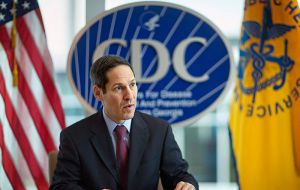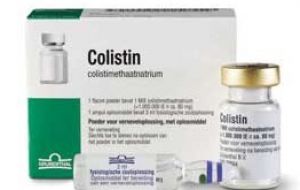MercoPress. South Atlantic News Agency
Superbug in US: Doctors fear it could herald a post-antibiotic era
 The recently discovered antibiotic-resistant gene, known as mcr-1, has also been found in China and Europe.
The recently discovered antibiotic-resistant gene, known as mcr-1, has also been found in China and Europe.  Its emergence in the United States for the first time ”heralds the emergence of truly pan-drug resistant bacteria, according to Thomas Frieden from CDC
Its emergence in the United States for the first time ”heralds the emergence of truly pan-drug resistant bacteria, according to Thomas Frieden from CDC  Colistin has been available since 1959 for infections caused by E. coli, Salmonella, Acinetobacter which can cause pneumonia, serious blood and wound infections.
Colistin has been available since 1959 for infections caused by E. coli, Salmonella, Acinetobacter which can cause pneumonia, serious blood and wound infections. A superbug resistant to all known medications has been found in the United States for the first time, raising new concern about the dwindling effectiveness of antibiotics, the top US public health official said this week. . The case involved a 49-year-old woman in Pennsylvania whose urinary tract infection tested positive for a strain of E. coli that is resistant to the antibiotic of last resort for such infections, known as colistin.
“It was an old antibiotic, but it was the only one left for what I call nightmare bacteria,” a family of germs known as carbapenem-resistant Enterobacteriaceae (CRE), said Thomas Frieden, chief of the US Centers for Disease Control and Prevention.
The recently discovered antibiotic-resistant gene, known as mcr-1, has also been found in China and Europe. Its emergence in the United States for the first time “heralds the emergence of truly pan-drug resistant bacteria,” said a report on the finding, published in Antimicrobial Agents and Chemotherapy, a journal of the American Society for Microbiology.
The report gave no details about the outcome of the Pennsylvania woman's case. Superbugs can be deadly, but not in all cases. The woman had not traveled outside the United States, so could not have acquired the resistant bacteria elsewhere, Frieden said.
“We know now that the more we look, the more we are going to find,” he added. “We risk being in a post-antibiotic world.”
Colistin has been available since 1959 to treat infections caused by E. coli, Salmonella, and Acinetobacter, which can cause pneumonia or serious blood and wound infections. It was abandoned for human use in the 1980s due to high kidney toxicity, but is widely used in livestock farming, especially in China.
However, colistin has been brought back as a treatment of last resort in hospitals and clinics as bacteria have started developing resistance to other, more modern drugs.
“We need to do a very comprehensive job of protecting antibiotics so we can have them and our children can have them,” Frieden said, calling for more research into new antibiotics and better stewardship of existing drugs.
“The medicine cabinet is empty for some patients,” he added. “It is the end of the road for antibiotics unless we act urgently.”




Top Comments
Disclaimer & comment rules-

-

-

Read all commentsThe Black Death can not survive in the tropics. This is very dangerous for the world first.
May 29th, 2016 - 03:35 pm 0So you think that you will be fine as it will not affect Brasil ?
May 30th, 2016 - 05:23 am 0You really haven't a clue. Tropical countries are riddled with bacteria. Most bacteria do not flourish in the more temperate latitudes so the five eyes win again !
If the doctors had had more will power and refused antibiotics for all those with influenza but were otherwise healthy we wouldn't have this problem.
May 30th, 2016 - 01:41 pm 0Commenting for this story is now closed.
If you have a Facebook account, become a fan and comment on our Facebook Page!